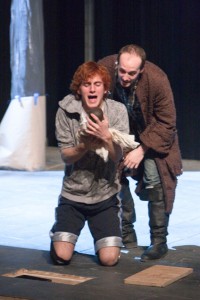
Living in the 21st century, it’s hard to imagine a time without technology. But Ithaca College Theatre’s most recent production, “Coram Boy,” which is set in the middle of the 1700s, flashes back in time to a place without cell phones, computers, televisions or even cars.
The story begins with young Alexander Ashbrook (sophomore Megan Ort) coming home from boarding school for a two-week long Easter break with his friend Thomas Ledbury. But his father Sir William Ashbrook doesn’t approve of his son returning to the school that is furthering his interest in music, especially since the young teen’s voice is expected to break soon.
The story unfolds into many different plot lines. Though it’s confusing at first, by the show’s end everything comes together. One of the many story lines includes Otis Gardiner (junior John Gardner), who’s known as a “Coram man.” Gardiner preys onto unsuspecting women who’ve just given birth but do not intend to keep their babies. Rather than bringing the infants to the Coram Hospital, as he tells the women he will, Gardiner buries them and pockets the women’s money after taking care of their “business.” Gardner conveys the evilness of Otis’ character, particularly with his display of physical violence, but the emotional depth of his character doesn’t quite come through.
Gardiner also enlists the help of his son Meshak (sophomore Patrick Mazzella), who is emotionally disturbed, to bury the children. While Meshak’s role doesn’t consist of much dialogue, he appears on stage for much of the show. Mazzella’s body language and facial expressions were executed well to show Meshak’s suffering.
The dark and gloomy scenery literally sets the stage for the show. The tall grey trees on stage left flawlessly morphed into the pillars of a chapel. The mostly dark, dull lighting worked well for the overall depressing story arc and added a natural feel to the scenery.
Though the show is not a musical, its choral theme brought in a performance complete with almost a full score. Music director/conductor Andy Collopy did a phenomenal job of blending the music with the unfolding scenes. The instrumental ambience, consisting of two violins, a double bass synth-sounding harpsichord constantly kept the audience on edge. The full chorus that sang from the balconies of the theater during some scenes added another wave of power to the already full sound.
While the performances were strong overall, it wasn’t until the second act that the direction really came together. With a long script at hand that uses the first act to set up all of the plot lines, the first half of the show dragged.
But the flash-forward to eight years later in the second act, when Alexander (Max Lorn-Krause) and Thomas (Ben Fankhauser) are adults, the show picked up the pace. Lorn-Krause and Fankhauser’s brilliant performances stole the show. They each managed to find a balance between drama and comedy in their deliveries, which kept the audience completely engaged.
The transitions from boyhood to adulthood worked seamlessly, particularly in Alexander’s case, as both Ort and Lorn-Krause appeared to have a familial resemblance.
The cast and crew’s risk to take on such a difficult production paid off as the audience was enslaved in the time warp even after the curtain fell.
3 out of 4 stars




